Ray Hecht's Blog, page 5
December 28, 2020
2021
Well, looks like we made it. A whole new year.
What an accomplishment!
Feels like the time for one of those particularly reflective end-of-the-year retrospectives, doesn’t it?
Much has already been said about how unique a time it has been, without getting into the morbidity of the topic. Perhaps I cannot add so much. Suffice to say it’s been hard times for a hell of a lot of people. No doubt about that.
Just hope it’s not terribly naïve to be cautiously optimistic now that we will soon enter a new era…
Life is never easy, and there will be a lot of challenges ahead. That said, it simply has to get better.
Right?
Things seemed to have truly turned around, or at least started to turn around, just at the very end. Politically speaking, that is. Yes, things are by no means all better just yet. That will take a lot of work, but the worst is seriously over with back in the home country and that makes for some real reason to feel hope.
Anyways, personally life is good here in Taiwan and I am grateful to be here. I get to be part of a positive community, I get to work for a living (though I don’t love that part), and I even get to be creative and then share my creativity from time to time. This current year started out with a cancellation of a book fair, and then we all had to wear masks. Blech. I would have liked to promote my own books a bit more, make some progress in that field instead of hit pause. Yet I did get to do a book fair last month so that was cool.
I changed jobs this year, I participated in an unlicensed regional Burn event, and I only traveled in-island. I even voted.
I survived the holidays, and now there’s only one more all-night party to go to with which to ring in the new year and that’s gonna be a lot of fun 
November 9, 2020
2020
[image error]
I don’t know how to feel about the rush of current events.
There is obviously some very good news. It was long dragged out, but seems to be coming to a close, and celebrations are indeed in order. That feeling of relief as a dead weight is assuredly going to go, sooner or later. Incredible times, especially after so much uncertainty.
But it’s still a lot to process. I’ll spare any readers from all my obnoxious political opinions, well-thought as I’d like to think them to be, and just express how this state of affairs still leaves me anxious.
I’m no pundit. I have my perspective, and I like to read and review and share my thoughts, but there’s not really any reason people should listen to me.
That said, I simply cannot escape this terrible sense that tens of millions of my fellow countrymen are undeniably bad people. I had no idea it could get this bad. It’s not worth it anymore debating and talking about fake news and racial bias and social hierarchies and brainwashing etc. It’s a fact and here we are. They are bad people and there so many of them.
What is my country and the world going to do?
Well, turns out in the end, the good guys (or at least the moderate-not-that-evil guys) have won/will win. The fight for so many issues goes on, for healthcare and peace and freedom, no doubt about it, and at the very least there’s still a chance now… perhaps state of the world can actually survive at this rate and progress…
I voted from afar. Funny thing, as a matter of fact, it’s the first time I have voted for the winning team. It seemed an emergency so I had to. But I remain an American abroad, a privileged expat, incredibly lucky to live in the only country on earth to have defeated the pandemic. I do have to wear a mask everywhere, slightly annoying, and there’s danger from the mainland, but above all I am in the greatest social democracy in Asia and I am grateful to be here.
Been weird staying on the island for an entire year. No travel, no airplanes. No visiting relatives, no exploring new cultures. And yet right now I am far luckier than the vast majority of the planet.
To feel hope for the environment of this world, for the climate, for the very air, and to have so much reason to worry at the same time. It’s all come to ahead, and 2020 isn’t even over. It looks like the danger to democracy isn’t going anywhere in the next couple of months, plenty of anxiety is going to continue. At the same time, hope exists. Humans may, believe it or not, make it through this.
Going back to ‘normal’ or not, there is a future. If we can survive the grueling present.
This damn year. Let’s try to make it through this, everyone.
September 6, 2020
Bookish Asia review: All Flowers Bloom
http://bookish.asia/all-flowers-bloom-%e2%a2-kawika-guillermo/
All Flowers Bloom, written by Kawika Guillermo and published by Westphalia Press, is a book that is difficult to define, let alone review. It is ostensibly a novel, classified as queer speculative fiction, but there is not exactly a plot to follow. At least, there is not just one plot but at least 26 smaller stories within. The protagonist is not only one character, but a multitude of characters linked by a resurrected soul repeating through time in chapters labeled from A to Z. Gender and nationality and circumstances change again and again, leaving the reader with strong impressions but hard to remember details… Not unlike a dream that way.
The main character, if a name can be given at all, is called 871. (The only other character, just S.) The only consistent setting to keep track of is the strange surreal limbo known as the Ilium, the afterlife waystation described irreverently as some kind of gaudy cruise ship, a lonely sort of paradise. There, this soul finds him or herself occasionally between lives, reflecting on what has come before.
That reflection is often about love, for this is above all a love story. The most epic love story imaginable, consisting of endless lifetimes as two souls find each again and again in new circumstances. Guillermo shows much range in writing about so many times and places.
When the journey begins, far back in Biblical times, the prose is already eminently powerful in describing the obsessive struggle to go on. “The day didn’t come by itself. We had to push the sun up, lift it with our arms to keep time from standing still.”
The whole setup of this world is not explained in so many words initially, leaving the reader to interpret. Eventually, some questions are answered, such as in a certain lifetime when the two intertwined souls find themselves in warring tribes and a shaman explains, “You were in love before you were born.”
However, another theme other than love that keeps coming up is the concept of death. There are the suicides, the lives failed. One lifetime ends with the execution of a Roman slave, a tragedy finalized by the beautiful line, “The debris of time stripped away until I collided with your corpse.”
All over time and place, the book keeps going. The Kanem Empire. Colonized India. Every land from history that can be imagined. In imperial China, the soulmates are prostitute-courtesans unable to admit they are lovers. Sadly, in many of these timelines love is a sin. In so many cultures, their love is a blasphemy. They are infidels.
Soon, the chapters begin to catch up to the 20th century, featuring American servicemen, World War II from the perspective of a German POV, and the nearly-modern 1970s. Meanwhile, in the afterlife ‘Pleasure Cruise’, he/she laments on all these past lives while hibernating eternity away. Yet if this sounds too serious, there’s also plenty there to lighten the mood “Heaven has alcohol,” they say. “That’s what makes it Heaven.”
This sort of book can be a challenge, admittedly. The questions asked and unanswered repeat themselves at times, the fanciful wordsmithing is something the reader can appreciate and also something that can be exhausting. “The stream was a consciousness,” the text explains, a metaphor most literal.
In Book Two, the poetry continues but suddenly an even more ambitious genre begins. As the present time comes and goes, we enter the science fictional era. So begins tales of the corporate wars to come, of digitally uploaded sentience, of post-humanism. This makes for some truly surreal futuristic sex scenes.
Foremost, this is still a spiritual tome. From the Islamicist references early on, to a bourgeoning Buddhist enlightenment as the novel progresses, religion keeps coming up. One question that is repeatedly asked and never answered to satisfaction, is that of who and what is a god.
“Do gods exist?” (s)he asks.
“We’re the only gods I know of,” is answered. “We are the only true gods.”
“We’re souls, not gods.”
“We. Are. Gods.”
And back and forth it goes into infinity, never truly explained.
Millennia later, it turns out that this story may be more cynical than all that love talk previously implied. Not that there wasn’t foreshadowing. “Love is a false desire when directed at one rather than many,” warned the Buddha. A good reviewer shouldn’t give too much away, but perhaps there’s a lesson in there about how when we get what we want it doesn’t always make us happy. Even if it takes four thousand years.
If all is erased, then was it just meaningless? That is up to the reader to decide. In the grand scheme across epochs, there were three phases: Generation, Optimization, and Destruction. Interpret that as you will.
As for the title, early in the book we are told that not all flowers bloom. Yet later, after so much philosophizing, another conclusion is reached. All Flowers Bloom!
So there is reason to hold out for hope after all. Don’t ever forget it.
August 4, 2020
Always Goodbye by Ray Hecht
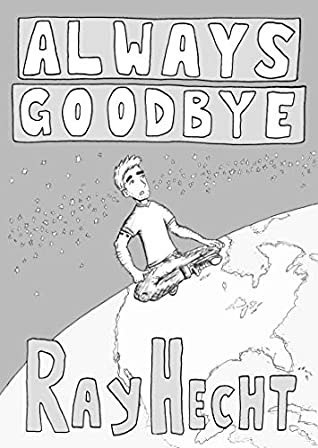
What I Says: An autobiography about somebody unknown and done in the format of a comic, how could that work? Well it worked for me, I really enjoyed reading this, I can’t stand those autobiographies by famous people full of name dropping and desperately trying to make every aspect of their life interesting. Always Goodbye is the sort of book that could be about you, the reader, if you are a child of the 80’s then you’ll see similarities to your own life in this book, as Ray Hecht describes events you’ll be going “I remember that” and you’ll end up on your own journey down memory lane. And being born in the 80’s means a lot of big moments in your life would be defined by technology, getting that first email address, joining myspace and Facebook, games consoles and smart phones are all big points in Rays life and until reading this I have never thought of things like that before.
A huge part of Rays life has been spent reading and making comics, falling in love with Marvel and DC universes and because he has that huge knowledge about comics it has made this book much more special. Some clever little bits really bring this to life, describing his parents, birth, upbringing and how they met was cleverly done, drawn as a column with each event side by side worked well. Each chapter starts off with a year of Rays life and the first window shows a significant event from that year and I loved trying to figure out what they represented. There was the odd quirky bit thrown in too which gave me a chuckle, favourite bit was Ray sat at his desk at school and the writing about the scene takes up so much space that he has to have his head at an angle.
The comic has been hand drawn, which gives it a personal touch that would have been taken away by a piece of software, whenever Ray draws one of his girlfriends the amount of detail increases until they are almost glowing, it shows just how important they were in his life.
I have really enjoyed reading about Ray’s life and now wish I had a time machine to go and get my hands on the sequel in 30 years time
July 12, 2020
Always Goodbye by Ray Hecht

What I Says: An autobiography about somebody unknown and done in the format of a comic, how could that work? Well it worked for me, I really enjoyed reading this, I can’t stand those autobiographies by famous people full of name dropping and desperately trying to make every aspect of their life interesting. Always Goodbye is the sort of book that could be about you, the reader, if you are a child of the 80’s then you’ll see similarities to your own life in this book, as Ray Hecht describes events you’ll be going “I remember that” and you’ll end up on your own journey down memory lane. And being born in the 80’s means a lot of big moments in your life would be defined by technology, getting that first email address, joining myspace and Facebook, games consoles and smart phones are all big points in Rays life and until reading this I have never thought of things like that before.
A huge part of Rays life has been spent reading and making comics, falling in love with Marvel and DC universes and because he has that huge knowledge about comics it has made this book much more special. Some clever little bits really bring this to life, describing his parents, birth, upbringing and how they met was cleverly done, drawn as a column with each event side by side worked well. Each chapter starts off with a year of Rays life and the first window shows a significant event from that year and I loved trying to figure out what they represented. There was the odd quirky bit thrown in too which gave me a chuckle, favourite bit was Ray sat at his desk at school and the writing about the scene takes up so much space that he has to have his head at an angle.
The comic has been hand drawn, which gives it a personal touch that would have been taken away by a piece of software, whenever Ray draws one of his girlfriends the amount of detail increases until they are almost glowing, it shows just how important they were in his life.
I have really enjoyed reading about Ray’s life and now wish I had a time machine to go and get my hands on the sequel in 30 years time
July 2, 2020
Always Goodbye: a review of the graphic novel by Frank E Beyer
https://medium.com/@frank.e.beyer/always-goodbye-b46c36a9d202
Always Goodbye

F E Beyer
A review of the graphic novel
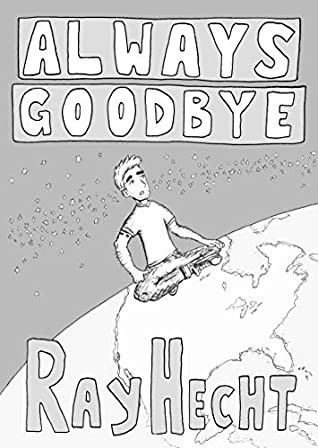
Ray Hecht’s autobiographical graphic novel starts with his birth in Israel, where his parents were immigrants, and ends up with him working in Asia. Moving to America as a small child he has an unstable upbringing, thanks to his Ukrainian mother and American father divorcing. The drawings and the layout here obviously took a lot of work and I dare say it may have been easier just to write the narrative, however, this was a more interesting way to tell his story. Each year is introduced with a picture of a key event and I laughed when I saw OJ’s Bronco being chased by police down the highway for 1994.
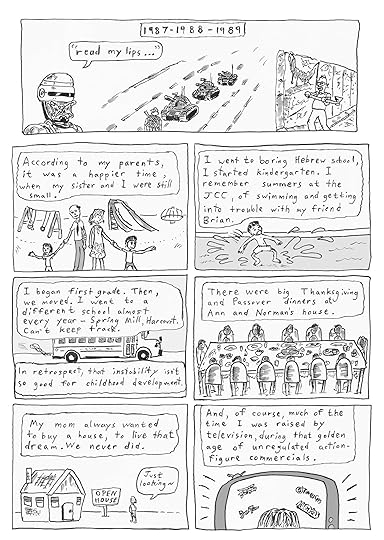
Things start out well for the family in America, but after a few years the cracks begin to show and his parents get divorced in the early nineties. His mother remarries a none-too trustworthy Israeli man and Ray stays with his Dad, who trains to be a nurse. Ray does recognise his father’s efforts to better himself. His sister is academic and as she grows up gets sucked into a conservative Israeli world that Hecht wants no part of. She learns Russian and presumably Hebrew too — as she moves to Israel and gets married there. Ray’s trips to Israel don’t work out well, it’s not a place he connects with. With this in mind, it’s not surprising that he prefers to study Japanese and later Chinese.
A self-confessed nerdy child, Hecht struggles socially and finds solace in comic books. (I was waiting for his reading to break out from the pure escapism of comics and this does eventually happen.) A convincing portrayal of how America can be a lonely place for a teenager, a lot of this must have been hard to bring to the surface again. One major problem for him is always moving from school to school, as the title indicates it is “Always Goodbye”. Probably the most painful incident is when he gets kicked out of school for something he says about a mass shooting. Despite being an introvert, he makes various efforts to improve his social life, investigating subcultures — punk, Goth, arty-type, straight edge, hippie — looking for something to hold onto. His friends do the same thing and he falls in and out with them depending on what phase they are in — a problem of a fractured society: you can join many different tribes but a sense of belonging is not guaranteed. He does some hallucinogenic drugs, but the answer doesn’t lie there.
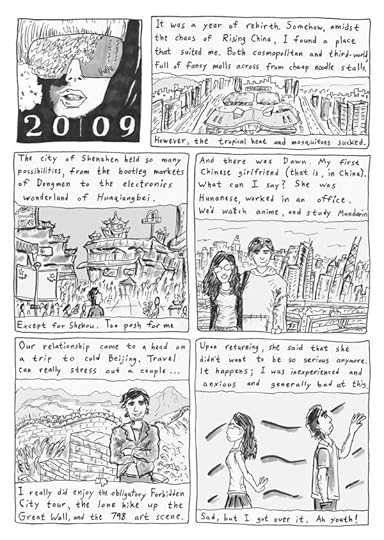
In his early twenties Ray moves out of his Dad’s place and back again several times, in a non-linear surge towards independence common in his generation. He has a string of dead-end jobs in various States and then vaguely commits to life in California. Salvation comes in the form of China, recommended to him by a random character at the Burning Man Festival 2008. Like many young Westerners who go to work in Asia (me included), it’s the first time he has the luxury of living alone in a decent apartment. He begins teaching at a kindergarten in Shenzhen, the huge city over the border from Hong Kong where everything is new and exciting. He mentions the bootleg markets and this reminded me that one of the pleasures (and even social activities) of living in China back then was shopping for pirated DVDs; now of course we just download movies without leaving the house. He survives the kindergarten, moves onto a Korean owned school in Guangzhou, and escapes the English teaching world to become a copy editor.
Ray realises that a lot of the expat life is about drinking and tries to find meaning through writing and dating. The dating doesn’t go so well, but gives him material to write about. While many say it’s easy to get an Asian girlfriend, it doesn’t work out most of the time because of different expectations and, sure enough, Hecht takes us through a few awkward flings. The world of online dating also turns out to be a wash-out. Despite these romantic failures, he publishes a novel and eventually gets involved in a serious relationship with a creative South African woman— i.e. finally he has some good luck. I was interested to read that he initially went down to Hong Kong every six months to get visas, but later got a ten year China visa. Surely long term visas like this are not on the table anymore?
The text isn’t that polished and there are still a few mistakes to be ironed out, or perhaps they were left in the on purpose to emphasize the DIY nature of this work? His analysis of society is usually spot on and you can see a narrow view of the world broadening as he travels more — this gives the story a nice arc. As a thirty-something he ends up in Taiwan, looking at current events it was probably a wise decision to leave China and move there.
June 1, 2020
Against the Web: A Cosmopolitan Answer to the New Right by Michael Brooks
Full disclosure: I am a big fan of The Majority Report podcast. Watching their video clips online has become a daily habit of mine for keeping up with the political world, especially during these tense last few years.
Co-host Michael Brooks (who also hosts his own solo The Michael Brooks Show) always has a very poignant take which I enjoy listening to, with the ability to summarize complex issues in a way both intelligent and entertaining.
The news market nowadays is indeed very oversaturated, particularly when it comes to opinions on YouTube, yet there is a reason I find myself drifting towards the Majority Report more than sources like the more independent and objective Democracy Now. Because in this current climate, it’s not just about getting the most facts. Anyone can do so if they want.
The battle over messaging has really become about being able to fight back against misinformation as much as anything else. And that is what I truly love about Sam Seder and Michael Brooks, that they aren’t above the fray at all—unlike that example I’ll use again, Democracy Now’s Amy Goodman. They fully take on the trending online garbage of the extreme alt-right, refusing to cede the internet world over to those charlatans.
For whatever reasons of history, social media’s biases tend to reward the worst of the worst when it comes to extreme political rhetoric. Even the old medias of cable news and talk radio can’t compete with the unfortunately powerful trolls of today.
But at least some people are fighting back, and are damn good at it. Therefore, I was very intrigued when I heard about Michael Brooks’ book project titled Against the Web: A Cosmopolitan Answer to the New Right published by Zero Books. The book is slim at only a hundred pages, which fits well as an e-book for those more low-attention spanned readers struggling to keep up with the information overload of the times.
The main focus of his critique concerns the so-called “Intellectual Dark Web,” the IDW, which is truly one of the dumbest names for the cheap yet successful motivational speakers who now pervade the gross right-wing. He starts of with an analysis of Sam Harris, who rose in fame as one of those New Atheist war-mongering neo-cons during the Bush era. Brooks lays out the laziness of his debate, which never truly was very intellectual at all. Particularly embarrassing is his email spat with Noam Chomsky, in which he actually says: “The history is completely irrelevant.”
And that’s it right there. These grifters cash in by presenting themselves as deep, yet don’t care to analyze how much of the state of the world is a product of historical context. Again and again, they are proven to have an authoritarian mindset, “a penchant for defending hierarchy” as Brooks expertly sums up. Even the late Christopher Hitchens was able to mock the “IQ obsessed.” He may have been wrong on Iraq, but I can’t imagine Hitchens today tolerating the logicbro nonsense of his old contemporaries.
Much of the book focuses on Jordan Peterson as well, the very definition of a self-help hack trying to cash in on the zeitgeist. Clearly, Peterson is not very good at being an academic as he flames the campus culture wars with his overuse of the term postmodernism—that catch-all nebulous term which is usually conflated with Marxism for no reason whatsoever. Peterson famously crashed and burned in his big Zizek debate, and has since gone so off the deep end that he is now in some of kind of rehab and/or in a coma in Russia of all places after hawking a bizarre all-meat diet. You can’t even satirize this stuff.
As Brooks says, “the Petersons of the world want to naturalize or mythologize the injustices we see around us instead of analyzing them as a function of historical process that, because they are human-made, can be rectified in the future.” They never were very interested in honestly learning what makes the world turn and, God forbid, trying to make the world better. The truth is, they only want Patreon subscribers.
The way they pretend to be victims and underdogs while growing in power is particularly infuriating. As he says, “The IDW and right in general love to have it both ways with free speech. On the one hand, if a reactionary is criticized for something they say, Free Speech is Under Attack. On the other hand, if a left-wing professor says something they find objectionable, or if too many faculty members have political views they dislike, they have no problem asking the government to step in to examine the curriculum and impose ‘balance.’” (Hell, check out the presidential Twitter fact-checking controversy happening right this very moment…)
“Still, right-wing media is one of the easiest gigs in the world.” You said it, Michael.
While it’s easy enough to dunk on the shallow Dave Rubins and Ben Shapiros of the world, that standard conservative trying to rebrand as wannabe intellectuals all of a sudden—and dunk he does, who couldn’t not reference Shapiro’s disastrous BBC interview with Andrew Neils—Brooks’ real point goes far beyond such critiques. The true core of his thesis is that it’s time for the left to do better in winning over that angry young man demographic these guys so easily convert.
Don’t let them use fake terms like “classical liberal,” don’t let them have free reign on Joe Rogan and then just hope the moral superiority of the left will actually win elections and change hearts.
In his final criticisms of the “ultra-woke” left, Brooks has much to say on why we should encourage moral growth instead of shaming and canceling, of which the latter often adds fuel to the bad faith arguments of the right. Personally, I think the apparent craziness of the university protest crowd has always been exaggerated and never was as big a deal as the clickbait merchants would have us think. But Brooks does have a point.
Like it or not, this new crop of right-wingers is a loud voice today. It’s time to understand them, so that the good guys can win. The end goal is a fair and just society, a cosmopolitan socialism as Brooks concludes which is able to express itself successfully in the modern landscape and that can unify the positive traditions of cultures from all over the world. That’s the fight worth having.
It is time to form an international message of solidarity, and the path forward with be both for the left to get it together and also to finally defeat the manipulative new right of the web.
So let’s do it!
May 3, 2020
Speaking of China: ‘Always Goodbye’ Ups, Downs in China, US and Beyond in Graphic Novel by Ray Hecht
https://www.speakingofchina.com/bookreviews/always-goodbye-graphic-novel-ray-hecht
In this midst of this worldwide pandemic, I’ve found myself passing on those dystopian novels I used to adore and instead seeking out a little more “comfort food” in the books I’ve read this year. Lighthearted, humorous and even self-deprecating stories of people grappling with everyday problems that you wouldn’t find in a disaster film have offered me much-needed refuge in these unusual and challenging times for all. Bonus if they touch on experiences I’ve had living here in China and Asia, including cross-cultural dating and relationships.
Thank goodness Ray Hecht sent me his new graphic novel Always Goodbye, which really hit the spot on all fronts.
The graphic novel spans Ray’s life from birth up to 2019, and it makes for a pleasant read, thanks to its honesty. As much as it charts the highs in his life, the novel also delves into those lows and failures too as he pursues a variety of different careers, not always with success. Ray approaches even difficult topics and moments with a refreshing sense of humor, and we could all use a laugh these days. And Ray’s experiences in moving to China and dating locals will resonate with those of us who have visited or lived here.
I’m honored to feature this interview with Ray Hecht about Always Goodbye.
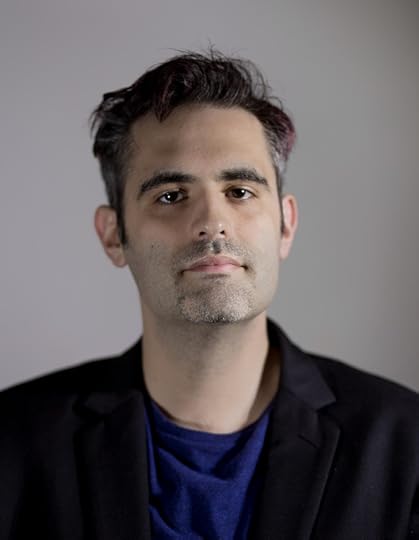
Here’s Ray’s bio from Amazon:
Author Ray Hecht was born in Israel and raised in the American Midwest. He currently lives in Taiwan.
You can learn more about Always Goodbye on Ray’s website. The graphic novel Always Goodbye is available on Amazon, where your purchase helps support this blog.
Why did you decide to create this graphic novel?
I’ve always loved the comics medium. I worry I”m not quite good enough at drawing, and that’s why I’ve been focusing on prose writing for most of my creative career, but after a bit of a dry spell in book publishing I decided to return to my first love…
The decision was partly due to me just trying to practice the art of cartooning again. Focusing on myself has worked well with my writing before, so why not? Autobiography/memoir has been an indie comics tradition for many years, and it simply felt right for me to share my perspective that way. When I sat down and thought about the whole of my life, with the second half focused on being an expat in China until in the “climax” finale I moved to Taiwan, it seemed like a story worth telling.
What’s the story behind the title?
To be honest, I struggled to come up with a title. At last, it came to me.
Perhaps it’s a somewhat dark interpretation, but the one constant in my life seems to be that I always move. I moved from Israel to Indiana to Ohio to California to Ohio again to California again to China to Taiwan.
That’s a lot of goodbyes. So what else could I call this, other than “Always Goodbye”?
In your graphic novel, you chose to organize it chronologically, through your entire life. Why did you choose this approach?
Good question. Indeed, such a narrative doesn’t necessarily need to be chronological. Nor must it start at the beginning. Authors more clever than me may have taken a non-linear approach, but I went with being direct.
Back when I first thought about how to explain my life in a way that made sense, taking notes and interviewing my mom, I realized I didn’t just need to start with my birth; I actually needed to start with my parents. So the first years covered were 1954 and 1956, in Chicago and in the Ukraine of the former Soviet Union. From there, naturally it led to the year that I was born, and so on.
Plus, it was fun to map out a pop cultural or technological marker. Once I started, I couldn’t stop. 1982 to 2019, every year needed at least it’s own little chapter.
What was your favorite year to detail and why?
That would probably be 2008. A seminal year for me.
It was of course the year I risked it all and moved to Shenzhen, China to do the expat thing. If it wasn’t for that, I wouldn’t be in the China blog scene at all! But even before I moved, over in Southern California, a lot changed in my life. Maybe in a way that was the year I finally grew up. The crazy Burning Man festival part of that story was pretty interesting as well.
Your graphic novel gets very personal, including in how it portrays people close to you, such as family and friends. How have family and friends responded to your book?
I’ve been very fortunate to so far have almost no negative criticism from anyone portrayed in the book. I feel extremely lucky and grateful for that, otherwise it could have gone awkward.
Even if someone did respond negatively: My philosophy is that they were my experiences and I have a right to express what happened as long as I was involved (so long as I don’t literally libel someone, or expose some deep dark secret or anything). There was a common sense balance to the portrayals. I also didn’t include any last names for obvious reasons.
I needn’t have worried. For the most part, I have found that a lot of people are flattered to be caricatured in a graphic novel by me!
What do you hope people come away with from reading your graphic novel?
I suppose the main hope is to increase readers’ empathy.
If you’ve met me in person, please read to get a better understanding of who I am and where I come from. If you haven’t met me in person, I do hope that my life stories around the world are interesting and entertaining, and can also give some sort of deeper window into a different person’s perspective.
After all, isn’t that ultimately what all art is all about?
Many thanks to Ray Hecht for this interview! You can learn more about Always Goodbye on Ray’s website. The graphic novel Always Goodbye is available on Amazon, where your purchase helps support this blog.





